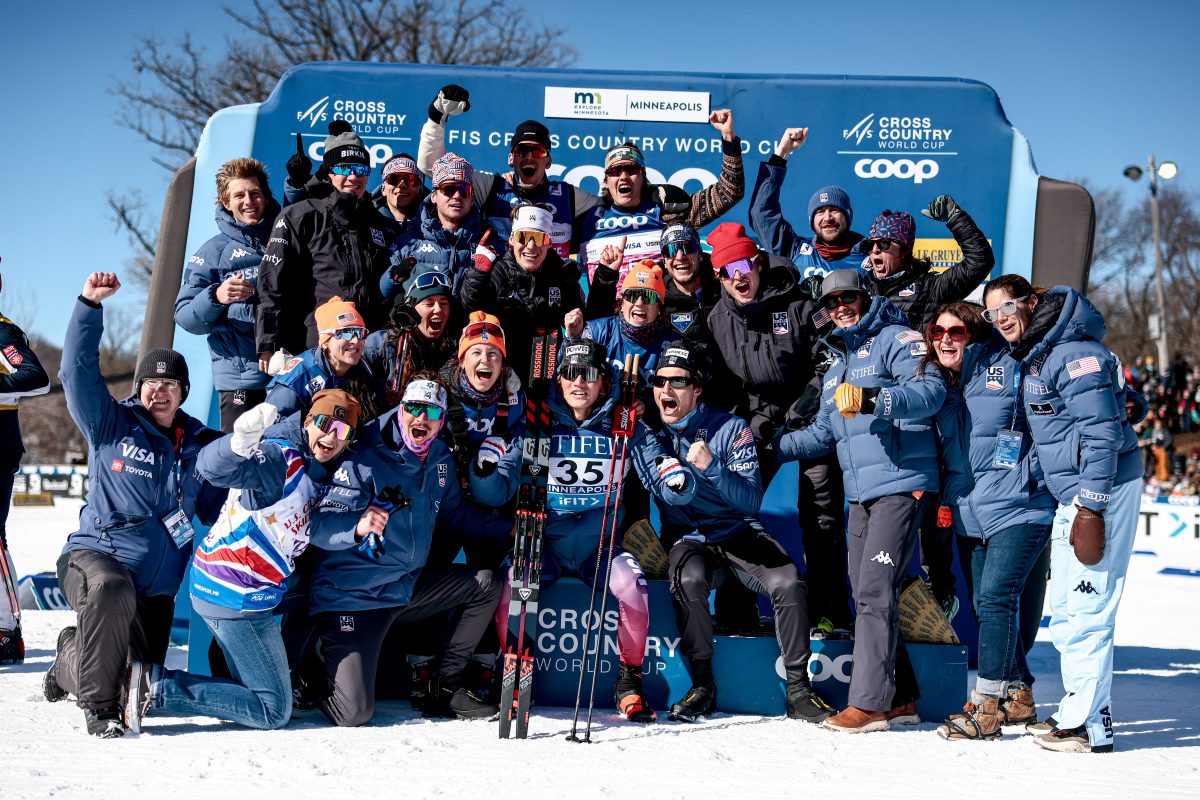
Even though carbohydrates continue to get a bad rap from the mainstream public, to endurance athletes they are still the gold standard of energy. “Carbo Loading” is the known term for eating more carbohydrates – such as pasta, bagels, cereal, and potatoes – in an effort to stock up energy stores before an endurance event.
But how much “carbo loading” is really necessary, and how much is just an excuse to eat that extra cinnamon roll at breakfast? Can eating too much or the wrong kind of food hamper your performance in any way? For these questions I went to Abby Larson, a former All-American at NMU and 2006 Olympian who has raced a number of marathons, including the Birkie (three times), and is now a registered dietitian who is completing her PHD in Exercise Science at the University of Utah.

My first question to Abby was the amount of extra carbs a person needed to eat in the week leading into a ski marathon. Her response might make you put down that box of crackers you are snacking on right now.
Larson said that the only reason you would seriously “carbo load” would be if you were racing marathons every weekend or every other weekend, and in that case the stocking of carbohydrates would be continual. But for someone who is trying to peak for the Birkie, the extra calories are just that: extra. Larson learned this the hard way, admitting that when she first started racing marathons and over-fueling, she ended up gaining 10 pounds in a single season.
“If you are peaking for a race, you’re going to taper off your training, and as a natural result of that you’re probably not going to have to adjust your food intake very much. Because you’re not training and you’re not using as much glycogen, you’re just naturally going to store it. . . .You don’t want to stuff yourself – you don’t want to cause yourself to gain weight as a result of this.”
I next asked about a method that I had heard of, in which a person eats more protein and very little carbohydrate in the first couple days of the week leading into the big race, followed by the next couple days in which the person would eat extra carbohydrate. I had heard this was a good way to trick the body into storing more carbohydrate for endurance use.
“I don’t ever advise people to glycogen deplete – what we call it – and then super-compensate, because it is unpleasant and you don’t really get enough benefit out of it to make it worthwhile. You don’t need to glycogen deplete[followed by super-compensation] in order to go into a race with fully stocked glycogen stores.”
So what is the best plan?
“You need to start being pretty aware of your nutrition three days before going into a big race. Just by following your regular diet, but by maybe increasing the amount by a little bit the two or three days leading up to [the race] is the best approach.
What about the night before the race? A huge past dinner?
“I don’t think eating a big meal the night before is a good idea, because you feel kind of sluggish the next day.”
 Instead, Larson recommends that the day before a race, consume sports drink throughout the day, 1-2 quarts (4-8 servings), depending on your body type and hydration needs. This achieves three things:
Instead, Larson recommends that the day before a race, consume sports drink throughout the day, 1-2 quarts (4-8 servings), depending on your body type and hydration needs. This achieves three things:
1. it tops off your glycogen stores
2. it hydrates you, while ensuring that you have enough electrolytes
3. it allows you to have a normal size dinner, and not have to worry about digesting the meal in time for the morning race.
So how important is the pre-race, morning meal?
Larson said that you should try for a nutritionally rounded meal, some carbohydrates and a little protein, a little fat. For herself, that means a peanut butter and jelly sandwich and a cup of coffee. But she was adamant about one point: NOT eating anything outside your normal diet.

“Stick with your usual breakfast – you don’t want to try anything funky. People always wonder what to do and they always do weird, funky stuff, and in the end that can be very counter-productive, so I think it’s important to remember to stick to your normal routine.”
Larson has seen people try to get an edge by eating what they think is the “right” kind of food on race day. She made the example of a friend who decided to eat oatmeal for the first time on race day – with disastrous results.
“If you eat eggs and bacon every day and you’re fine with that, you can go out and ski after that, and that’s what you feel good eating, well – by all means – do that. Don’t eat a big bowl of oatmeal – because you’re probably going to poop yourself!”
 How about coffee?
How about coffee?
Larson has the same advice: stick to your normal routine.
“If you don’t normally drink four cups of coffee in the morning, it’s probably not a good idea to do that on race day morning! If you drink four cups of coffee when you only used to drinking one, you know what’s going to happen. . . . !”
How about the hours between breakfast and race time?
Larson knows a lot of racers who like to eat a sports gel and drink half or a whole bottle of water before the race, and she thinks that is a good idea. Or, if you don’t like sports gel, you could just drink a half or a whole water bottle of sports drink.
If you are racing hard, you don’t have to worry about having to pee during your race because your kidneys don’t get enough blood flow to actually make you have to urinate.”
Alright, that takes us up to the race. Now, during the race, how much should a racer try to eat and drink?
For the highly competitive racer Larson recommends trying for 8-12 oz of sports drink or one sports gel with 8-12 oz of water every hour.
“That’s on the low end, not as high as what’s recommended, but seriously, when you’ve got ski poles in your hand and you’re racing hard you’re not going to realistically get in more than 12 oz an hour – and that’s if you’re diligent!”

Something Larson warns NOT to do is mix sports gel and sports drink, because that puts too much sugar, or glucose, in the stomach.
“When we exercise we don’t get a lot of blood flow to our stomach and by putting in a big bulbous of glucose, you’re stomach can’t digest it as fast as its coming in, just as a result of the lack of blood flow, so then you’re going to get an upset stomach.”
If mixing your own sports drink from powder, Larson says the manufactured directions on the can should be the ones to follow because they provide for a mixture which is 6-8% solution, which Larson explains is “the percentage where [glucose] is most easily absorbed.”
Well, if we do all these smart things before the race, and get through the race, is there something a racer can do to maximize a speedy recovery?
“Ideally, as soon as you are done racing, you’ll put on some dry clothes – that’s the first thing you should do. Then, as tolerated – you know, some people have an upset stomach after they race – you should start eating as soon as possible. And you want to make sure you’re eating healthy, nutritive food because you’ve just really taxed your body, taxed your system, so what you really need are some antioxidents.”
Larson said the goal would be to drink a quart of water and eat a sports bar within 30 minutes of racing, with a substantial meal happening within an absolute maximum of 2 hours after racing (ideally that meal would be within 1.5 hours, post-race).
What if I’m so happy that I’ve actually made it across the finish line that I don’t care about post-race diligence?
“Don’t go to the Sawmill [a local bar] and get wasted! Or, before you go to the Sawmill and get wasted, don’t go to the Moccasin [another local bar] and drink beer immediately after racing!”
“ Ideally, you’d probably hydrate with water. You’d probably hydrate with a non-fermented beverage,” says Larson, though she conceded that her point “might be moot,” as most racers she knows are in too much of a celebratory mood after finishing the Birkie to care about their momentary health. But if you are going to celebrate with fermented beverages, Larson says she would recommend beer over hard alcohol, because “at least with beer you get some hydration and carbs.”



